 |
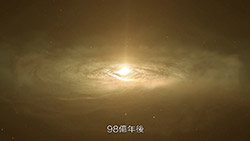 |
 |
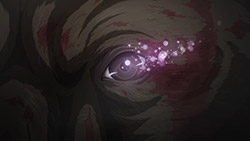 |
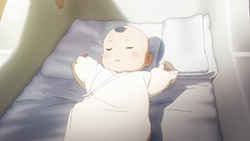 |
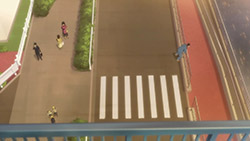 |
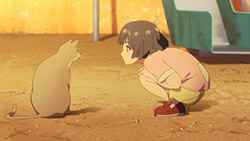 |
 |
 |
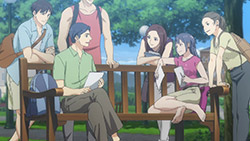 |
 |
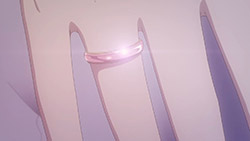 |
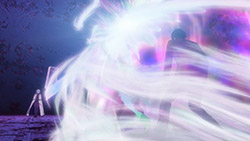 |
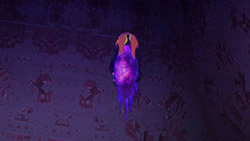 |
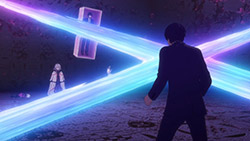 |
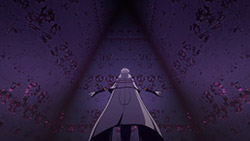 |
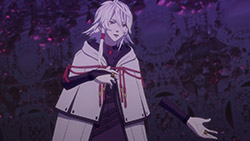 |
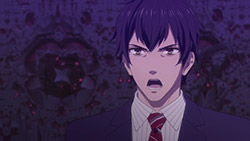 |
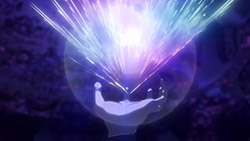 |
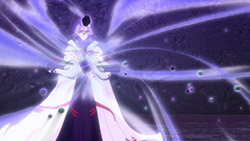 |
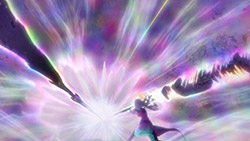 |
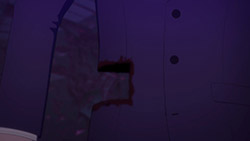 |
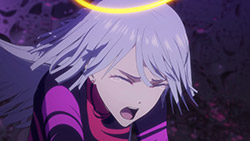 |
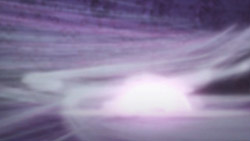 |
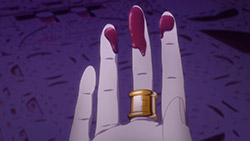 |
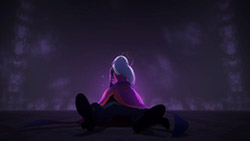 |
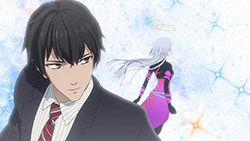 |
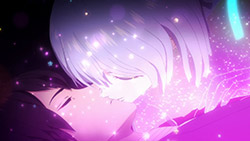 |
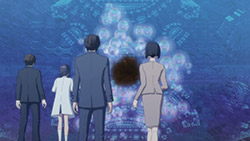 |
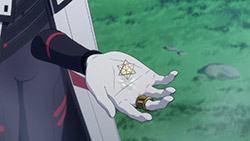 |
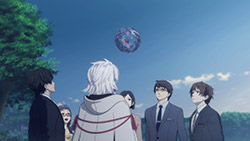 |
 |
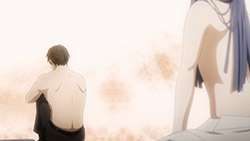 |
 |
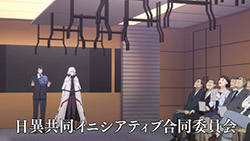 |
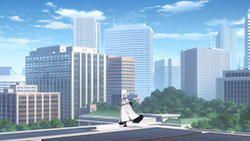 |
「トワノサキワ’」 (Towanosakiwa’)
“Towanosakiwa'”
Last week I was talking about how Seikai Suru Kado broke character and did a complete 180° turn to become a JRPG, and that’s no more evident to me than when I sit down and try to write one of these posts. I’ve been enjoying Kado as science-fiction, so each week I’ve been discussing the its vision of the future, critiquing its worldview, and debating its philosophy on technology and social progress. Now? I’m not exactly sure, as Kado moves from sci-fi towards fantasy. I consider sci-fi a sub-branch of fantasy, and we really should talk about the distinguishing elements at some point, but for now it’s sort of like the difference between Star Trek and Star Wars. It’s not a bright line, but generally sci-fi wants to look plausible, and therefore Star Trek will babble on about positrons and whatnot. But fantasy just needs you to accept the implausible, and therefore Star Wars can play around with magical space wizards.
You can see how moving to one to another may be jarring. A big plot twist near the climax of your story is not inherently a bad thing, and I’m not going to say that Kado made a huge mistake in direction until I see it all pan out. But it does need to be handled with care. Let’s take Star Wars again. It’s more fantasy than sci-fi. We accept ‘the Force’ as a core conceit of the movies. But then, the prequels introduces ‘midichlorians’. It tries to explain the Force. Why? Doing so simply undercuts the fantasy that was built up in episodes IV to VI. The end result is a compromise between fantasy and sci-fi, but it doesn’t make the Force seem plausible, nor does it enhance an acceptable fantasy. Kado may be doing the same thing, but in the opposite direction, introducing more fantasy into it’s sci-fi. It’s certainly possible that Kado juggle both sci-fi and fantasy well, but it’s much easier to do it badly. It’s certainly more ‘out there’ now. Before, we could talk about hypothetical responses to a friendly alien encounter, and maybe the implications of an unlimited power source. Now? There’s something about ascending to a higher plane of existence, dangers of transferring three-dimensional human meatbags to the 37-layered anisotropic wonderland, and other things that go over my head. I don’t know if I’m just not versed in alien superphysics, but none of that sounds like a plausible hypothetical I’ll ever need
to consider. So now I’ve got nothing to talk about.
To be clear, I’m not saying this was a bad episode, in an of itself. Tsukai’s backstory is definitely necessary. We got a bunch of drama and special effects. We even got a bit of romance, or something like it (because Shindou has the personality of boiled celery and is incapable of chemistry with anybody). There are many entertainment vectors there. Again, I would play Kado: The Videogame. But was everybody looking for a videogame? Hmm.
Well, I think we’ll get back to the philosophy eventually. There was some talk of Tsukai being a ‘naturalist’ and competing views in the anisotropic, Shindou at last finds enough spine to speak up, Za seems to be growing doubts and may perhaps finally be open to the idea of being mistaken. It’s certainly possible that this can all be settled with honest debate, without resorting to the lasersword argument.
Preview
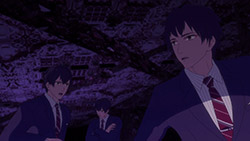 |
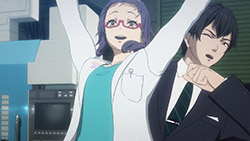 |
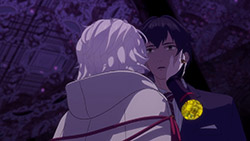 |

https://randomc.net/image/Seikai%20Suru%20Kado/Seikai%20Suru%20Kado%20-%2010%20-%20Large%2022.jpg
i lol’ed at this, it’s remind me of thenshihan beam, what’s with that rectangle wound? hahaha
seriously the only thing that interest me in this episode was tsukai backstory…too bad they’re no telling that much, so many question unanswered like what’s the deal with her ring? and did she reincarnated or she planted her consciousness to that baby?
https://randomc.net/image/Seikai%20Suru%20Kado/Seikai%20Suru%20Kado%20-%2010%20-%20Large%2005.jpg
Looked to me as though the consciousness of one anisotropic being is present in each created universe and can migrate from one entity to another. So we saw it go from plants to animals (the bear being one example) and then to a human child. Where the ring came from is a mystery, though – she didn’t have it as a child, but it was clearly functioning as some kind of limiter that suppressed her true identity.
https://randomc.net/image/Seikai%20Suru%20Kado/Seikai%20Suru%20Kado%20-%2010%20-%20Large%20Preview%2001.jpg
– Railgun, when she suddenly receive many Twin Sisters. it is the same logical behind this. Will the “original” one accept suddenly his twin Brothers?
https://randomc.net/image/Seikai%20Suru%20Kado/Seikai%20Suru%20Kado%20-%2010%20-%20Large%2001.jpg
https://randomc.net/image/Seikai%20Suru%20Kado/Seikai%20Suru%20Kado%20-%2010%20-%20Large%2002.jpg
p.s. Nice Special Effects and Pictures. The Color, the details all is good. Praise the “creator” of this pictures
https://randomc.net/image/Seikai%20Suru%20Kado/Seikai%20Suru%20Kado%20-%2010%20-%20Large%2035.jpg
– Seems like he give Humanity now the secret of “Element Zero” (Mass Effects), now that comes in very handy, then imagine Air street traffics like in “the 5 Element” and “Back into the Future”. But for that they need to fight the traffic pollution or it will get much worse
also, Za did not say he hate lies or Liers? And here he is playing himself…
It all depends of whta constitutes a lie in his eyes, you´re using the definition of lie according to human standars, Za is an alien so it might mean something different for him.
Offtopic:
The CG Studio here, are good. Perhaps you can give Knights of Sidonia S3 a hand (the news is fresh, brought out by Twitter) Yes, they announced Blame 2 and Knight of Sidonia Season 3 in France
if you have free Menpower, go ask them for work. You have the skill
offtopic end
There is going to be a season 3 of Sidonia no Kishi? That´s awesome!.
To be honest, this didn’t come as jarring at all. In fact, I was expecting something like this since the series started.
Sufficient advanced aliens, ascension to higher planes of existence, multidimensional beings and a long fantastic etcetera are staples of many famous classic sci-fi stories, from Childhood’s End to 2001: A Space Odyssey, which are obvious influences in Seikai Suru Kado. In that regard, the series is not muddling the limits of sci-fi and fantasy, but playing old-school sci-fi tropes straight.
Are those old-school sci-fi stories actually fantasy? Perhaps, although those types of discussions tend to end with hard sci-fi fans trying to pull a No True Scotsman over softer sci-fi settings. In the end, it’s a matter of genre conventions, like how psychic powers are considered sci-fi and magic spells fantasy despite both having the same lack of scientific basis.
to be honest here, too
This Speach of Za remembers me of Capt. Sisko meets first time the aliens inside the Wormhole
lol, it really does actually. Doesn’t help that Shindo basically is the emissary for Za.
The thing about sufficient advanced aliens is that our arguments about how they might be wrong about a situation might not resonate at all with them, after all they understand the universe way better than we do, so I´m really curious how Shindou is going to convice zaShunina of backing off, still, recent episodes have demostrated a fundamental change in zaShunina´s personality, he has become more human-like so they might help resolve the conflict.
It’s less about the thematic elements that are employed, and more about how they are portrayed aesthetically. For example, Star Wars could have exhaustively explained lightsabers and their construction and the theoretical pseudo-physics behind them (and indeed, a lot of the derivative source books do go into detail). But it doesn’t, because it used a fantasy aesthetic rather than a sci-fi one. It doesn’t need to explain the implausible, and in fact shouldn’t, leaving it as something the audience accepts as part of suspension of disbelief. As long as the world is internally consistent we’re usually fine.
Sci-fi, though, makes the fantastical plausible, and part of its entertainment is engaging the audience in considering its hypothetical vision. Kado could have just been about gods clashing over the direction of creation, but sine its sci-fi it engages us in thinking about technology and guided social progress and whatnot. Those are issues we can identify with and think about and perhaps apply the answers to our own understanding of the human condition. If Kado gets too out there, though, it grows beyond the realm of plausibility, and the questions asked will be similarly implausible. Will ascending to a higher plane of existence where the aliens that created our universe live cause me to lose something that essentially makes me human? Er, I dunno, you tell me.
But I’m talking about aesthetics too. I mentioned Childhood’s End and 2001 precisely as examples of classic First Contact sci-fi stories that end in metaphysical psychedelia.
In fact, Seikai Suru Kado looks more and more like a more down-to-earth adaptation of the former, where advanced aliens come to Earth ostensibly to bring the wonders of galactic technology and culture to humans, but their real goal is to help us ascend to a higher plane of existence no matter what the cost.
In general, the anime seems to be heavily inspired by Arthur C. Clarke’s kind of sci-fi (in which, yes, questions such as “will ascending to a higher plane of existence where the aliens that created our universe live cause me to lose something that essentially makes me human?” take a front seat). It can be done better or worse, and they’re definitely not everyone’s cup of tea, but those tropes were part of the sci-fi genre long before the Internet even existed.
@Mistic
We quibble over details, perhaps, but I think you talk of the sense of the profound, which indeed is a staple of sci-fi. Because sci-fi should plumb the unknown, and the unknown is often profound. But there is a very fine line between the profound and pretentious nonsense. It’s like with the use of technobabble; some stories manage exposition well, others simply throw out long words as a smokescreen. It’s a matter of execution, which is something I think we agree on. I’m not saying that Kado falls on one side or the other, just pointing out the line exists, that for me Kado is waving its foot over it, and that if it steps over it’s going to lose me somewhat.
I agree with your misgivings about the fine line between the profound and pretentious nonsense (ugh, the part about technobabble is so true). Nevertheless, it wasn’t me who stated that such line was between “fantasy” and “sci-fi” and made it the core of the review, so I can’t help if my
pedanticpassionate inner sci-fi fan jumped to the call 😉In this case, I think genre expectations were important. While you saw a jarring change of genres, for me it was yet another typical sci-fi twist. One that contrasted too much with the previous tone of the series? Perhaps, but I can’t say I wasn’t expecting it.
I stand by the distinction between sci-fi and fantasy. Many things acceptable in pure fantasy are simply not acceptable in hard sci-fi, and Kado is, I think we can agree, fairly hard. It’s not in the twist itself, it’s in the form, not the actual plot but the way the story is told. When Kado stopped talking about humanity’s issues and talked about gods bragging about their power levels, when it settled the clash of ideologies with laser swords and not introspection, then it loses hold of its sci-fi aesthetic. Is the main thrust against Za’s ‘right answer’ really going to be that humans ‘can’t endure the transformation from the universe to the anisotropic’? What does that mean? Well, to me, that means nothing. I can contemplate the impact of an inexhaustible energy supply on humanity. But the reliability of alien dimension conversion software? They may as well be talking about space whales.
@passerby agree about the form of hard sci-fi, if i have to give example this is like watching the difference between psycho-pass 1 and psycho-pass 2.
i feel the former was far more enjoyable because while it’s full of action and gore there are some scene that makes me contemplate the effect of sibyl system on humanity, like is it really good to kill or jailing all people that have violence tendency using criteria by the system? or is it good for people if their career was chosen by the system? etc etc then behold psyco-pass 2 bringing huge dominator rifle and killing everyone in the hospital mwahaha.
the same with kado..at the start za introduce this and that techonology and people across the world talking about how it will influence the world.
when i hoping they will shown how infinite energy affect on oil-producing country, behold za goes full darth vader and destroying the concept of negotiation.
@Passerby
That is a false dichotomy you have there, Passerby, as if Kado could only be hard sci-fi or pure fantasy, but not the many shades of sci-fi in-between.
I, for one, never agreed that Kado was truly hard. Instead, I guessed (correctly) that all the signs pointed to something akin to a “Childhood’s End in the Azure: The Trailblazing Arrival of Space Odyssey”, as Tv Tropes puts it. Thus, my reading of the current developments in fundamentally different. On the other hand, I can definitely understand why viewers may be disappointed with this turn, especially if it isn’t the kind of sci-fi they expected it to be. Not everybody likes space whales.
@Mistic
Obviously, I don’t think the dichotomy is false at all, but you keep talking about developments when I’m talking about delivery, so I’m probably not getting through to you. Therefore, let me just leave a question I don’t need an answer to hanging in the air: why midichlorians?
If you don’t think the dichotomy is false, does that mean you believe that if a show isn’t hard sci-fi, it is fantasy?
Perhaps I do mistake your point about the delivery. As I understand it, I think you’re saying that Kado’s approach was strictly hard and trying to explore realistically the effects of sudden alien technology in our real world. That it was supposed to be its core. And the introduction of space gods changed that completely in both theme and aesthetics. Forgive me if I got it wrong.
If I got it right, however, that’s why I insisted on genre conventions and developments: if you expect the space gods, the hard sci-fi wrapping is just the cherry on top and the change in delivery is exactly what should be happening at this point, not a jarring surprise.
As for the midichlorians, the answer is “too little, too late”. Had midichlorians been introduced in A New Hope, no one would be batting an eye. But retconning the rules after decades of established canon sits badly no matter the genre. Kado isn’t in the same situation.
No no, why midichlorians. Why did Lucas introduce them? Why did he have a scene about measuring midichlorian levels? And it’s not something I’m demanding an answer to, it’s just something I think is worthwhile to think about.
Toei script writers can’t seem to think things through. Based on the anisotropic conversation, Saraka’s impulse lead her to enter our universe at the risk of destroying the entire cocoon. That would have meant no humanity, ever. zaShunina desires to progress humanity and bring it into the anisotropic at the risk of destroying much or maybe even all of it. If the risk Saraka took was acceptable then then why isn’t zaShunina’s plan? It actually seems less reckless in comparison.
Yeah, it looks jarring that most of the warnings are about Wa/Saraka risking herself, and then in the middle “space will warp, and the cocoon will be destroyed”!
Still, checking the timeline, she enters our universe 4 billion of years ago, roughly the origins of life on Earth (the “singularity”, I suppose). At that point, there’s no humanity. So from the point of view of multidimensional beings that seem to create universes at whim, the worst that could happen would be that she might destroy the beautiful work of art that they had made and some interesting bacteria. Billions of years later, however, humanity is a special existence (trope!) and risking them it’s not as funny as risking a bunch of prokaryotes.
the 3-4 Pictures sequence, suggest for me that she already or more enter this cocoon, and the drive was curiosity. When the host died, this anisotropic just went on, like a soul
to be clear, this anisotropic talk is way over my head. i understand it more as the being outside our galaxy, something like Za
So Za was not the first
perhaps she was even the cause of the “Big Bang” we know
God is a Girl
This second anisotropic being might be absolutely necessary to have the negotiation with the negotiators the story features. Before this Humanity had no standing to negotiate with Za at all in that Humanity had nothing to deal with. But given powers on both sides now we can have a negotiation especially if the second being is powered up a little. Having a second anisotropic being also gave a way to do an exposition on the anisotropic without it being too boring.
This show now has a similarity to The Melancholy of Haruhi Suzumiya. The Data Integration Thought Entity (Data Overlords) is a group of data beings who wish to evolve further but cannot and want new data. This story is driven by the need for new data. The Data Overmind wants new input and comes to Earth to get it. The Data Overlords have immense powers to change things in our existence but are too advanced to interact with humans naturally so they have to make humanoids to interact with humans In the Haruhi story the faction in power does not want changes but another radical faction attempts to kill someone to provoke change. The conflict between members of the Data Overmind is part of the story. Tried to leave out details to leave it somewhat mysterious if you watch it sort of slice of life in high school with weird things happening at times. It was a very popular show.
Za-Shunina is showing some indications that he is pondering. It is also clear that in the past he has not really considered humans real or more valuable than ants in an ant colony.
The only major plot point that may be in error is this story is based on the old concept that Humanity might be the only intelligent species in our Universe based on older ideas on how common planets are, and older ideas on life originating that made life occurring much less likely.
Our new knowledge has made the chance of other intelligent life go from might not exist to almost certainty of billions and billions of intelligent life forms in the universe. (I saw the truly large number estimated now but can’t recall how many digits)The changes include almost every star system having planets. Actual evidence of rocky worlds in the inhabitable Goldilocks zone makes Earth-like planets way more likely. Rocky worlds including the nearest star which has changed the concept of traveling to another star rather pointless considering the expense with almost not chance of finding life, to making serious people start making serious ideas on how to go there in a reasonable amount of time maybe 30 years. (awaiting further evidence that the rocky world we found has water or not will determine effort) We now know that it possible for life to evolve under sheets of ice anywhere in a solar system on a geologically active planet or the moon. Life on a moon orbiting a Gas Giant in the habitable zone like in Star Wars is considered possible.
With our new knowledge of life, just one Universe Humanity loses its special place in this story. The huge number of life forms in a Universe that Star Trek and Star Wars had used to be considered a major flaw, now it seems likely that is the case. And coevolution theory being developed indicates that yes many will be somewhat human looking like in Trek. Side note Kirk having an alien babe in every planet matches the real history of exploration of the Earth. There is a certian number of population that will find new genetic material possibilities fascinating.
I don’t mind the second anisotropic, but I would also like to think that humans would be able to make a case against alien intervention by ourselves, if only we weren’t so distracted by Za’s shinies and actually took the effort to ask questions about him and his agenda. In any case, Za’s not an alien in the ‘fellow lifeforms in our universe’ sense. He’s a god being, one of those who literally created humanity’s universe. But people in JRPGs overthrow gods all the time, so eh.
Oh, I like for humans to make our case as well but up till now, humans had no way to make Za take the argument seriously and actually listen.
You know, I think what has impressed me in the story and still makes me feel like it was the same show I thought it was was because of how it is teaching my perspectives. Like many people, I was supportive of Za and like the Minister, I thought people like Saraka were too traditional and selfish, opting for some human dignity when they’re only able to make those decisions because they live secured lifestyles. But the new perspective of us being unprepared for such progress and how we’re able to process what we have now because we took our time getting to where we are now has made me question if the advancements were really something we should use. What Za essentially wants, by inviting humans to the anisotropic, is to abandon being a human. The concept of living, surviving, society, individual – they’re all going to be different. Za thinks that the advancement is good – and it is – but Saraka insists that we’re not ready. Humanity itself will lose the meaning of what makes them human in the first place. The lifespan mentioned being an example.
So I think it may just be the script that has gotten weaker. The plot and direction itself makes sense. But the lines themselves aren’t so clear and delivering the idea they want. Like when Shindo asked what the right answer was, Za didn’t really give the answer I was expecting – or even an idea of what the answer I was expecting. IE it should have had more debate.
What a trainwreck. I had such high hopes for this show. Wouldn’t be surprised if the last episode is a galactic battle, with opponents shouting exposition at each other.
Wait, did those 2 just had upper/intra-dimensional space sex?
‘This is just how it has to work.’
If Saraka’s personality is anything similar to Natsume’s, I’m totally ok with all of this.
Star Trek and Star Wars
Trek: Fantasy. Human-alien interbreeding (Spock), magical teleporters, alien gods, apparently the Federation, hundreds of years in the future, has invented one robot. Everything shiny. A few people (e.g., spock, various aliens, etc.) have magic psi powers like telepathy, but, unrealistically, humans seem not to have much religion.
Wars: SF. Robots integrated into society and used as tools. No magic teleportation. Things are realistically run down in backwater planets. Some “humans” have learned magic psi-powers like telepathy, but, realistically, it’s treated as a religion.